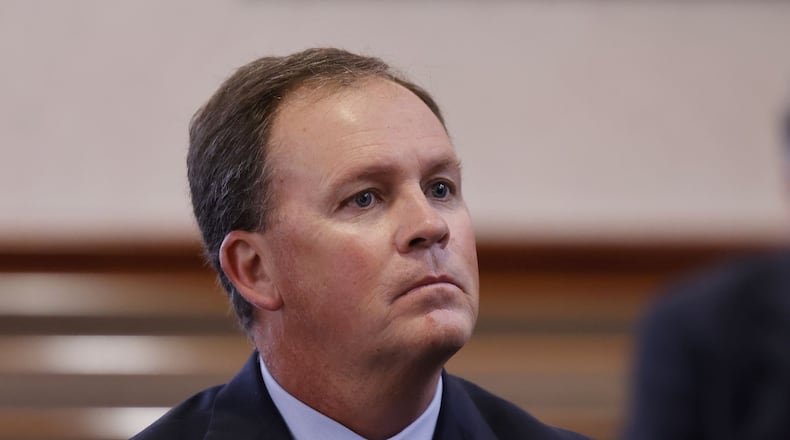“Reynolds cannot be left to continue to exercise the rights and privileges as the Butler County Auditor while under indictment for misusing the authority of that very office...,” the filing reads. “To be sure, Reynolds’ alleged criminal conduct adversely affects the interests of the public. Elected officials hold offices of trust and confidence. The allegations leveled against him lay waste to the public’s expectation that elected leaders are committed to serving their constituents’ interests, and not lining their own pockets.”
Reynolds pleaded not guilty during a brief arraignment and his trial is scheduled for Aug. 15.
O’Connor was required to appoint what is called a 3.16 Special Commission, comprised of three retired judges, which she did on March 1. They were charged with making a preliminary determination on temporary suspension within 14 days.
The commission must determine “whether the public official’s administration of, or conduct in the performance of the duties of, the official’s office, as covered by the charges, adversely affects the functioning of that office or adversely affects the rights and interests of the public and, as a result, whether the public official should be suspended from office.”
The panel will have copies of the indictment, Yost’s suspension request, in which he provided details surrounding the indictment and a statement Reynolds filed.
Supreme Court spokeswoman Lyn Tolan told the Journal-News the preliminary decision won’t be made public, “the statute requires us not to make anything public until the final determination.”
Reynolds’ attorney filed a statement with the court basically saying he is the victim of a witch hunt by the state as punishment for his challenging a mandated property value hike in 2020, “there is no valid, non-political basis to suspend Mr. Reynolds.”
This story has been in the news since the sheriff began investigating in August and a civil lawsuit was filed in September. Reynolds said this adverse publicity has not hampered is office operations at all, so therefore a temporary suspension is unnecessary.
“The facts alleged do not suggest that Mr. Reynolds’ ‘administration of, or conduct in the performance of the duties of, the official’s office, as covered by the charges, adversely affects the functioning of that office or adversely affects the rights and interests of the public’,” the statement reads. “Mr. Reynolds has never committed any crime, and a suspension under R.C. 3.16 is unwarranted.”
If the commission determines suspension is unwarranted the proceedings stop there, if they find he should be, he has two weeks to contest the finding. Reynolds’ attorney Chad Ziepfel also attacked suspension commission process.
“As one Ohio Supreme Court justice put it, this is ‘a sham proceeding reminiscent of the Spanish Inquisition.’ The special commission makes a preliminary determination before the public official is ever entitled to view the evidence against him,” he wrote.
“Only after the commission makes a preliminary determination that the public official should be removed from office does he have a chance to review ‘the reasons and evidence for the determination’ — meaning that the commission gets to start making up its mind while the evidence remains secret, unknown to the public official or the public. But even after the public official gains the right to review the evidence, he has a paltry two weeks to prepare for the hearing.”
Reynolds can appear at the hearing with Ziepfel but according to the rules, “that attorney is not entitled to act as counsel or advocate for the official, or to present evidence or examine or cross-examine witnesses before the Commission.”
AGs office Press Secretary Steve Irwin said there have been eight suspension proceedings for public officials since January 2019 and his office paid about $9,500 for those inquiries. All eight were suspended. If Reynolds is suspended he will continue to receive his annual $108,662 salary. If he is found guilty he must repay it.
The retired judges on the panel all served on county common pleas courts: David E. Cain, Franklin County, L. Alan Goldsberry, Athens County and James L. Kimbler, Medina County. The law states that at least one member of the panel must be a member of the same political party as the public official, which in this case is Republican. Cain is the lone Republican.
The judges will be paid $84.54 hourly and reimbursed for expenses. The AGs office is responsible for paying the bill. Visiting judges have been appointed by the high court to handle both Reynolds’ criminal and civil cases, they are being paid $77.74 hourly. The county is responsible for $7 per hour of that rate and travel expenses, the high court pays the remainder.
About the Author

